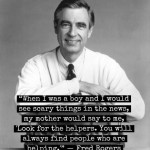What do you say to the children about Violence?
 With today’s horrific events in Boston, MA, we are once again reminded of how fragile life is. We place ourselves in random every day events and wonder what would happen if a bomb went off or a shot rang out. Life must go on though, we cannot hide from it in our homes and hope that tragedy never happens near us.
With today’s horrific events in Boston, MA, we are once again reminded of how fragile life is. We place ourselves in random every day events and wonder what would happen if a bomb went off or a shot rang out. Life must go on though, we cannot hide from it in our homes and hope that tragedy never happens near us.
As parents, we also have to decide how to discuss these events with our children. Our 21 year old son Dylan feels that his generation will be marked by the events of 9/11. Among his friends they divide themselves into those who remember what happened that day and those that don’t. Just as I’m sure another generation marked themselves by the attack on Pearl Harbor.
And it’s not just large scale bombings or terrorist attacks that need to be explained. There is always war news on TV and there are mass shootings of innocent people and the fear that we are not safe in our schools, shopping malls, theaters or other public gathering places. This can cause anxiety in children, an anxiety that could last a lifetime if not handled properly.
When the Newtown school shootings occurred, a wonderful story about Mister Rogers was in the Washington Post. The concept is so simple to understand, especially for young children – “Look for the helpers”. This is what I would tell young children – look for the people who are helping, whether they are in uniform or not. And those people will always be there, as witnessed today when video of the Boston Marathon explosions showed people running toward the source of the explosions. Those are the helpers. Knowing that there will always be someone there to help in an emergency will make a young child feel safer.
For older children, it’s not letting them get too caught up in the media frenzy that happens after these types of events. The constant attention paid on cable news, social media, and newspapers can be overwhelming. Know when to turn it all off and try to be there with your child to discuss what they are seeing on the news and how they feel about it.
Many people say we live in dangerous times, that things were better when they were kids. And yet, I have a friend in her sixties who remembers drills in case of nuclear attack and backyard bomb shelters. The 1960’s were marked by political assassinations and bloody civil rights riots while the 1970’s saw the Vietnam War played out nightly on network news.
Learning how to help our children understand and handle violent events will go a long way in helping them feel secure in the world.
Find other good advice from:
Parenting Press
American Psychological Association
